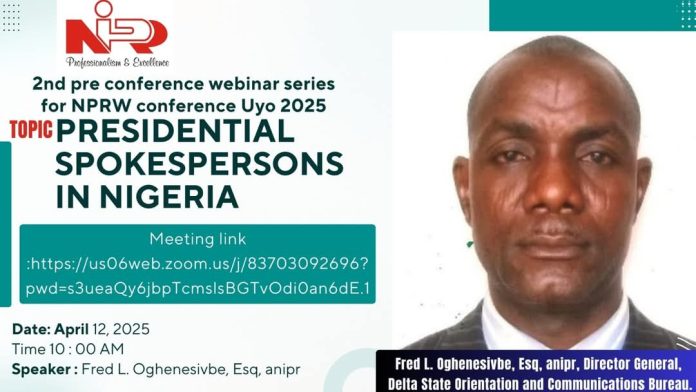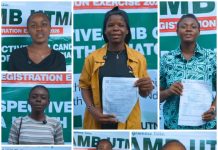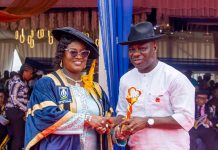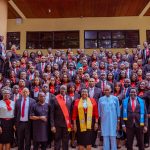…Oghenesivbe set for NIPR national spokespersons summit in Abuja
An assessment of the credentials and performance of presidential spokespersons in Nigeria’s Fourth Republic has revealed that Dr. Reuben Abati, Pastor Femi Adesina, late Dr Doyin Okpe, late Mrs Remi Oyo and Segun Adeninyi, were effective communicators, and performed reasonably well more than their counterparts between 1999 and 2024.
Dr Fred Latimore Oghenesivbe, Director General of Delta State Orientation and Communications Bureau, made the disclosure on Saturday while speaking as NIPR guest lecturer in the second pre conference webinar series for NIPRW conference, tagged Uyo 2025, and the NIPR National Spokespersons Summit holding in Abuja from Monday 14th to Thursday 17th April, 2025.
He spoke on the topic: “Perceived performance of Presidential Spokespersons in Nigeria’s Fourth Republic.”
Dr Oghenesivbe’s NIPR webinar lecture was an offshoot from his Postgraduate dissertation at the Department of Mass Communication, University of Lagos, and proudly endorsed by NIPR Council. He assessed the Public Relations Credentials and Performance of Presidential Spokespersons in Nigeria’s Fourth Republic, wherein he contextually analyzed multifaceted data on late Dr Doyin Okpe, late Mrs Oluremi Oyo, Uba Sani, Segun Adeninyi, Ima Nibiro, Femi Adesina, Dr Reuben Abati, and Chief Ajuri Ngilale.
The assessment guided by the four models of Public Relations; Credentialism Theory, and Role Theory, as well as quantitative content analysis of spokespersons profiles and career trajectories was supported by a survey of 73 professional Public Relations practitioners perception of individual performance.
The study which was keenly supervised by Dr Unwana Samuel Akpan of the Department of Mass Communication, University of Lagos, earned Oghenesivbe accolades from academicians and PR executives, as well as members of NIPR Council.
Dr Oghenesivbe disclosed that the research findings revealed a prevalent reliance on the Public Information Model, characterized by one-way communication, which limited public engagement and trust-building, adding that while some of the presidential spokespersons demonstrated strong media backgrounds, the majority lacked formal public relations education, experience or certifications before appointment, raising concerns about their preparedness for dynamic communication demands.
The Communications Bureau Chief who is also the incumbent Public Relations Officer of the Delta State Chapter of NIPR, stated that his study revealed that the effectiveness of spokespersons depends on adopting interactive communication approaches, aligning credentials with professional standards, and clearly defining roles. He emphasized targeted training in public relations, professional certification, credentials acquisition, and the adoption of the two-way symmetrical model to enhance trust and credibility.
Among the assessed presidential spokespersons from 1999 to 2024, late Mrs Oluremi Oyo received the highest mean score of 2.96, which places her performance in the “Fair” category. This suggests that Mrs Oyo is perceived to have done better compared to her peers, with PR practitioners acknowledging her ability to manage the complexities of her role as presidential spokesperson.
According to Dr Oghenesivbe, Dr Reuben Abati received a second place mean score of 2.88, Dr Okupe 2.84, Femi Adesina 2.75, Ima Nibiro 2.64, Segun Adeninyi 2.62, Ajuri Ngilale 2.40 and Uba Sani 2.36. The relatively low mean scores for Uba Sani and Chief Ajuri Ngilale highlight specific cases where PR practitioners believe substantial improvements were needed.
The study revealed that Dr Abati, Mrs Oyo, Dr Okupe, Femi Adesina and Segun Adeninyi mean scores indicate that these individuals were perceived by professional PR practitioners as competent but not outstanding in their roles. Their performance reflects a satisfactory level of public relations practice, where they likely maintained appreciable government’s messaging, crisis/image management, good media coverage, and engaged with the media and public to an appreciable and reasonable extend.
Dr Oghenesivbe further stated that Femi Adesina, Dr Reuben Abati, Ima Nibiro and Chief Ajuri Ngilale, frequently increases the volume of positive messaging to overshadow criticism. This suggests that they are particularly proactive in managing negative feedback through an optimistic counter-narrative, saying that a strategic combination of the Public Information Model, and the Press Agentry/Publicity Model cannot be overemphasized.
He stated that most spokespersons lack essential public relations training, which undermines their professional effectiveness, and more specifically they do not possess the specialized qualifications and certifications required by the Nigerian Institute of Public Relations, NIPR, which emphasizes formal education and accreditation as necessary for PR practice.
Dr Oghenesivbe’s study observes that most spokespersons preferred controlled media interactions over public dialogue, reflecting a broader tendency to prioritize government image management, noting that Femi Adesina and Dr Reuben Abati employed media-centric strategies that align with the Press Agentry/Publicity Model, which focuses on generating favourable media coverage rather than fostering public engagement.
In contrast, spokespersons like Mrs Oluremi Oyo and Ima Nibiro adhered to the Public Information Model, which emphasizes transparency and factual communication without aggressive media manipulation. This divergence communication models illustrates different approaches to managing public perception and the government image.
Dr Oghenesivbe recommended that Spokespersons should obtain formal public relations and communication training from NIPR to enhance their expertise and meet professional standards, balance traditional and digital media strategies by incorporating real-time social media engagement with controlled messaging through television and newspapers for broader audience reach.
He further recommended that spokespersons should prioritize transparent communication models, such as the Public Information Model to provide factual and open communication with the public rather than focusing on managing government image, while government communication team should engage in more interactive public dialogue, addressing public concerns and government messaging rather than relying exclusively on controlled media interactions, so as to foster greater public trust and responsiveness.
Dr Oghenesivbe’s study made significant contributions to both the practice of PR, particularly on the context of government Communication. It offered practical guidance for PR professionals and government communicators by emphasizing the importance of formal public relations training and certification. It contributes to academic research by providing emperical evidence of the evolving media strategies employed by spokespersons in Nigeria.
He stressed the need for PR practitioners and aspiring members to support NIPR’s mission to elevate professional standards in public relations by promoting the importance of ethical practices and formal training to strengthen the credibility of PR practice within Nigerian governance.

















